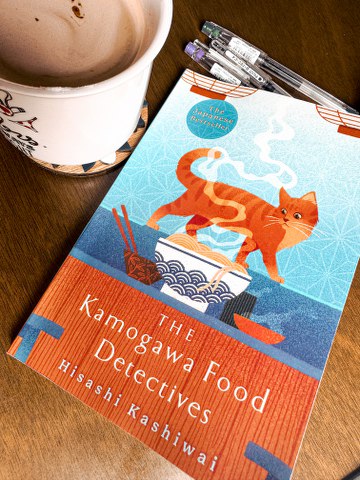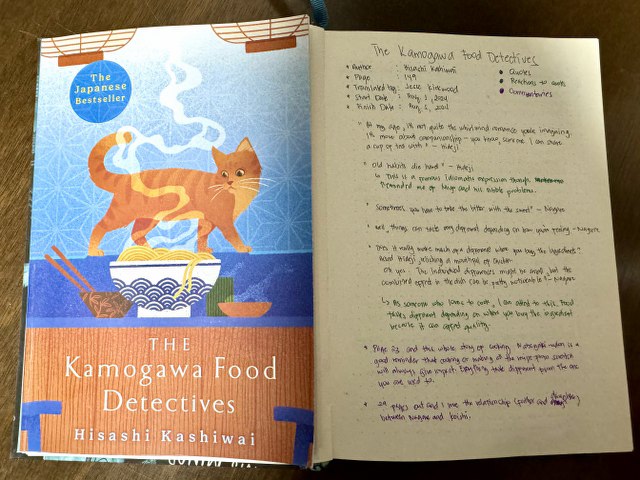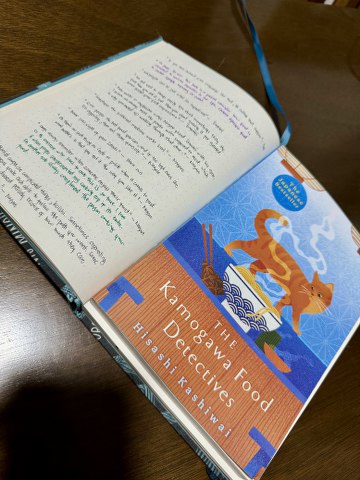Author: Hisashi Kashiwai
Translated by: Jesse Kirkwood
Setting: Tokyo, Japan
Pages: 149 – Paperback
Geemiz Rating: 4/5

It took me a while to read the book because I initially thought it was another typical investigative story. While the investigative genre is my cup of tea, I’m currently trying to diversify my reading. You might ask why I didn’t read the plot summary first—well, I accept your criticism and agree with you on that, hahaha. By the way, I’ve been exploring more Japanese literature lately, and it’s been a refreshing change!
“Well, things can taste very different depending on how you’re feeling” – Nagare
Food is one of the things that reminds us of so many memories – good or bad, happy or sad. It’s one thing that will make us cry and nostalgic.
Like Before the Coffee Gets Cold Series, The Kamogawa Food Detectives has short stories woven together to create a heartwarming novel.
“Nostalgia can be just vital an ingredient” – Tomomi
I love how every dish in the story doesn’t just evoke memories of the past but also transforms the characters in the present. It provides closure for past events, brings important principles to mind, rekindles old feelings, and strengthens familial relationships.
“Does it really make a difference where you buy the ingredients? asked Hideji, relishing a mouthful of chicken. Oh Yes. The individual differences might be mall but the combines effect in the dish can be pretty noticeable” – Nagare
The chapters are broken down into dishes and the food is well described so I am salivating even though I do not know most of them hehehe. As I was about to finish the book, I was thinking what would be the food I wanted the Kamogawa’s to recreate, or what are the foods of my childhood that I miss the most?
“Fate works in mysterious ways. Nagare fixed Tomomi with a gaze. I reckon we always meet the people we’re supposed to meet. Which is why you ended up walking through the door” – Nagare
I realized that certain chapters of my life are deeply intertwined with specific dishes. The egg soup with malunggay that Papa used to cook to sober up, the corn grits porridge my paternal great-grandmother served us during summer visits, and the dinumugan (sticky rice with banana and sugar) my maternal aunties, Mama Nit and Mama Ning, made during fiestas. I fondly remember the Ngohiong and Siomai from my college days, the Pochero my father-in-law cooks, the sinangag my mother-in-law prepares, and the Jollibee burger steak that my husband really loves.
“We get used to things easily. You think somethings tasty the first time you eat it, but then you start taking it for granted. Never forget your first impressions” – Tomomi
As someone who loves to cook, I found the book resonating deeply with me. It highlights how every recipe impacts a dish, and how each food has its own unique taste. This reminds me that it’s okay if someone doesn’t like your cooking—it simply means they’re not used to your style. And let’s not forget, it’s always important to compliment the person preparing your meal. This sentiment, woven into the story, adds to my growing appreciation for Japanese lit, which often captures these delicate nuances so beautifully.
“Chefs always remember when someone enjoys their food” – Nagare

Quotes from The Kamogawa Food Detectives
“At my age, it’s not quite the whirlwind romance you’re imagining. It’s more about companionship – you know, someone I can share a cup of tea with” – Hideji
“Old habits die hard” – Hideji
“Sometimes you have to take the bitter with the sweet” – Nagare
“If you mess around with language like that, it’s culture that suffers” – Tae
“Sometimes the bitterest medicine works best” – Nagare
“Serve people the best food you can, and if the leftovers are less appealing, then eat them yourself” – Nagare
“Never lose sight of your ideals” – Haru san
“Oh, there’s no such thing as rude or polite when it comes to food. What matters is that you eat it the way you like it.” – Nagare
“Married couples are complicated things, Koishi. Sometimes separating just means you’re each able to follow the path you want. Some couples get divorce precisely because of how much they care about each other” – Nagare
“You can be separated in all sorts of ways, and end up very far away from each other, but the bond between you never breaks” – Nagare
“Eating a good food wasn’t just about enjoying it, but also being grateful of it” – Nagare

About The Kamogawa Food Detectives
The Kamogawa Food Detectives tells the story of Nagare, a retired police detective and her thirty-something daughter Koishi. This father-daughter duo is running an unmarked tucked-away restaurant in Kyoto that does not just serve an exquisite Japanese meal in their Kamogawa Diner but also helps the right individuals to recreate the meal they are longing for at the Kamogawa Food Detective Agency.
The book has six different stories, each arranged in two chapters, one where the client comes to the diner/agency with their story and case and the second when they return which is usually in two weeks’ time as that’s how long it takes to fulfil their request.
If you are looking for another Japanese translation book with charming stories about life and whatnot, then The Kamogawa Food Detectives is for you. You can also check here more Japanese translation books and here Korean translation books.
Have you read the book? I love to hear what you think!
Read More of my Book Reviews Here
More of my book musings and flexing
https://www.instagram.com/geemizbooks/
Let Us Connect:
I’m on Instagram, Facebook, Youtube, Twitter, and LinkedIn